Notifications

New: Manuka KIss Bodywash
Cleanse. Calm. Protect. A gentle, 100% natural body wash made to support eczema-prone skin and help prevent flare-ups before they start.
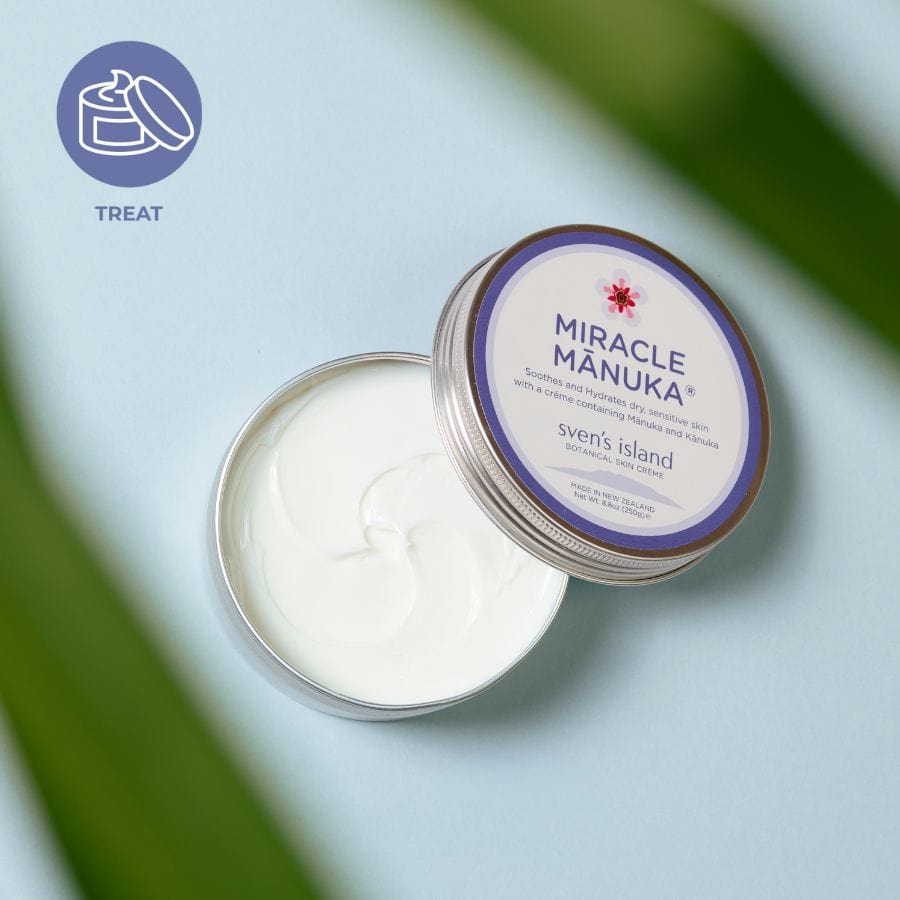
New: Miracle Manuka - Crème 250g
Moisturize. Protect. Prevent. A 100% natural eczema cream designed not just to soothe — but to help prevent flare-ups before they begin.
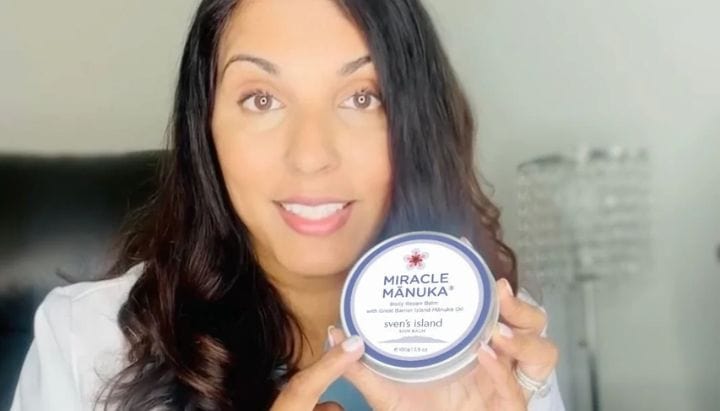
Dermatologist Endorsed
Trusted by experts, proven by 75,000+ happy customers — see why dermatologists recommend Miracle Manuka.
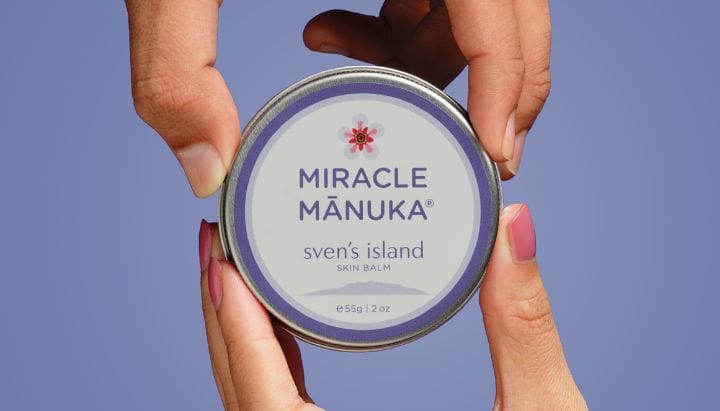
New: Miracle Manuka 100g
Your favorite skin savior, now in 100g! More relief, less refills.
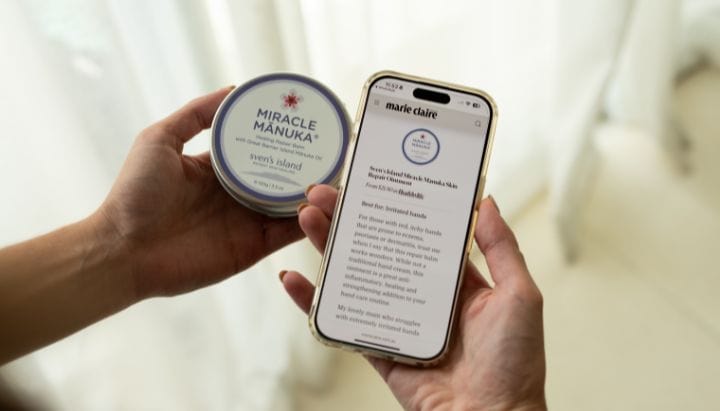
2,250+ ★★★★★ Reviews
Real results, real relief — join thousands who trust Miracle Manuka for their skin.
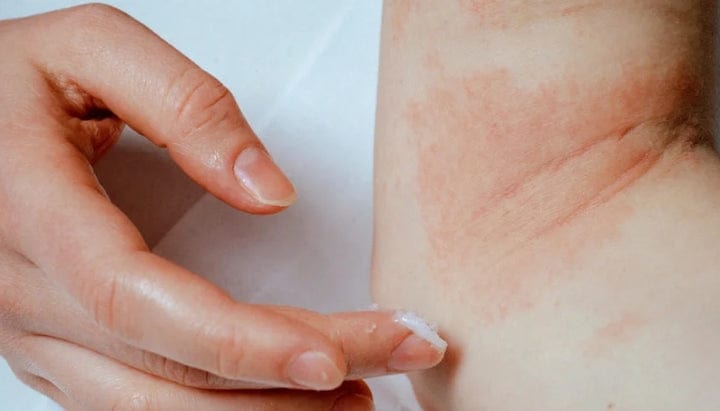
Discover Real Customer Results
See how Miracle Manuka is transforming skin—real stories, real results.
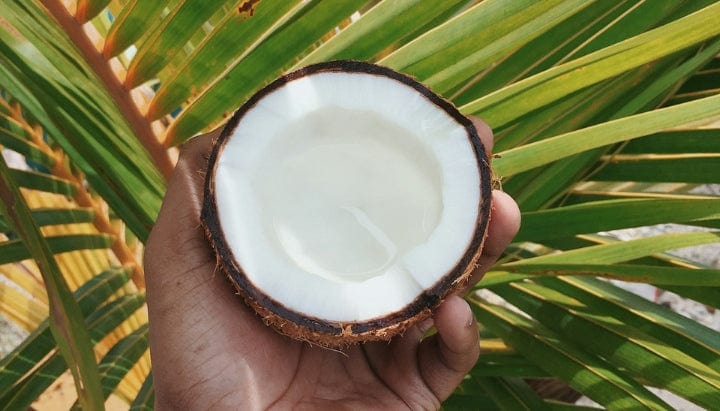
Unveiling Our Ingredients
Learn what makes our formulas so effective—pure, potent, and natural.
Mothers’ Guide to Managing Baby Eczema Naturally
If your little one is struggling with dry, itchy skin, you’re not alone. This guide walks you through safe, natural ways to soothe baby eczema, avoid common triggers, and bring comfort back to your child’s skin — without relying on harsh steroid creams.5 min read ⬇
Understanding Baby Eczema: Why It Happens
Eczema (also called atopic dermatitis) affects up to 20% of babies worldwide.
It often appears as dry, red, or itchy patches on the cheeks, arms, legs, or behind the knees.
The exact cause isn’t fully understood, but common triggers include:
- Immature skin barrier
- Genetics (family history of eczema, allergies, or asthma)
- Irritants like soaps, detergents, or fragrances
- Bacterial imbalance on the skin (particularly Staphylococcus aureus)
Understanding these root causes is the first step in finding natural, gentle solutions for your baby.
Recognising Symptoms Early
Spotting eczema early can make a big difference in how quickly and effectively you can bring your baby relief.
Eczema often starts subtly, so paying close attention to your child’s skin is important.
What might begin as a small dry patch can quickly turn into widespread irritation if left untreated.
Signs to look out for include:
- Red, inflamed patches (often on cheeks, arms, or legs)
- Persistent itching (your baby may rub against sheets, clothing, or scratch with their hands)
- Dry, rough, or scaly skin that doesn’t improve with regular moisturisers
- Oozing or crusting in more severe cases, which can sometimes indicate infection
By recognising these symptoms early, you can step in with gentle, natural care before flare-ups worsen. This not only helps soothe your baby’s skin but also prevents discomfort, sleepless nights, and scratching that may lead to infection.
Safe, Steroid-Free Alternatives for Baby Skin
Many parents are prescribed steroid creams as the first line of treatment for baby eczema.
While these can provide short-term relief, long-term use may lead to side effects such as skin thinning and increased sensitivity.
It’s no wonder so many mums and dads are searching for gentler, steroid-free alternatives that can still bring real results.
Here are some natural, proven options that are safe for delicate baby skin:
- Miracle Manuka Balm: A 100% natural, dermatologist-tested balm proven to fight Staphylococcus aureus, a leading eczema trigger. It soothes redness and itch while supporting the skin’s natural barrier.
- Coconut oil & beeswax: These provide deep hydration and help lock in moisture, preventing dry patches from worsening.
- Oatmeal baths: Finely ground oatmeal can calm irritation and reduce itching, making it a gentle home remedy many parents swear by.
Choosing natural, steroid-free solutions allows your baby’s skin to heal and strengthen over time — without the risks linked to stronger pharmaceutical treatments.
Daily Skincare Routine for Eczema-Prone Babies
When it comes to managing baby eczema, consistency is everything.
A gentle, predictable routine helps strengthen the skin barrier and reduce the risk of flare-ups.
The key is to keep things simple, natural, and soothing.
Here’s a safe daily routine many parents find effective:
- Bathing: Give short, lukewarm baths (5–10 minutes) using mild, fragrance-free cleansers. Avoid hot water, as it can strip away natural oils and worsen dryness.
- Moisturising: Immediately after bathing, while the skin is still slightly damp, apply a rich balm like Miracle Manuka to lock in hydration and calm irritation.
- Barrier care: If your baby tends to scratch, use soft cotton mittens or gloves at night to protect their skin while it heals.
- Spot treatment: Reapply balm throughout the day to any areas that look red, dry, or itchy. Frequent top-ups can prevent small patches from turning into full flare-ups.
By following a consistent routine, you give your baby’s skin the best chance to stay calm, nourished, and comfortable — day and night.
Common Triggers to Avoid
Even the best skincare routine can be undone if your baby’s skin is constantly exposed to common irritants.
Because babies with eczema have a weakened skin barrier, they are more sensitive to everyday products, fabrics, and environmental factors.
Here are some of the most common triggers to watch out for:
- Harsh soaps and bubble baths: These strip natural oils and leave skin more vulnerable to flare-ups.
- Fragranced products: Perfumes and artificial scents in lotions, wipes, or detergents can cause irritation.
- Wool or synthetic fabrics: These can be rough or trap heat. Choose soft, breathable cotton instead.
- Overheating: Dressing your baby too warmly or using heavy blankets can trigger itching and sweating, both of which worsen eczema.
- Strong detergents: Always use fragrance-free, gentle laundry liquid designed for sensitive skin.
- Food sensitivities: In some babies, flare-ups may be linked to diet (e.g., dairy or eggs). If you notice a pattern, speak to your doctor or allergist.
By removing or minimising these triggers from your baby’s daily life, you can significantly reduce the frequency and severity of flare-ups. Pairing this with a soothing, protective balm like Miracle Manuka helps keep their skin more comfortable and resilient day to day.
When to See a Doctor
Most cases of baby eczema can be soothed and managed at home with a gentle, natural skincare routine.
However, there are times when professional guidance is important to keep your little one safe and comfortable.
You should see your GP or dermatologist if:
- The skin is oozing, bleeding, or showing signs of infection (yellow crusts, swelling, or pus).
- Eczema is spreading rapidly or covering large areas of the body.
- Over-the-counter or natural solutions haven’t improved symptoms after consistent use.
- You suspect food allergies or environmental triggers are playing a role in flare-ups.
Remember, you don’t have to choose between medical advice and natural care — the two can work together. Doctors can help rule out allergies, provide testing if needed, and guide you on safe treatment options that complement your natural routine. When in doubt, trust your instincts and seek professional support.
Discover The Solution To EczemaReal Stories from Mums Who Found Relief
Living with a baby who has eczema can feel exhausting and disheartening, especially after trying product after product with little success. But thousands of families across New Zealand and Australia have found hope again with natural, steroid-free solutions like Miracle Manuka. These are more than just reviews — they’re stories of relief, better sleep, and renewed confidence for both babies and their parents.
“I tried everything for my daughter’s eczema — steroid creams, moisturisers, natural oils — but nothing worked long-term. Miracle Manuka changed everything. Within a week, the redness and itching eased, and now she sleeps through the night. I finally feel hopeful again.”
Emma’s story is just one of many. Parents consistently share how quickly they’ve seen improvements, from reduced redness and itching to calmer nights and happier, more comfortable babies. Relief is possible — and it can start with a gentle, natural approach.
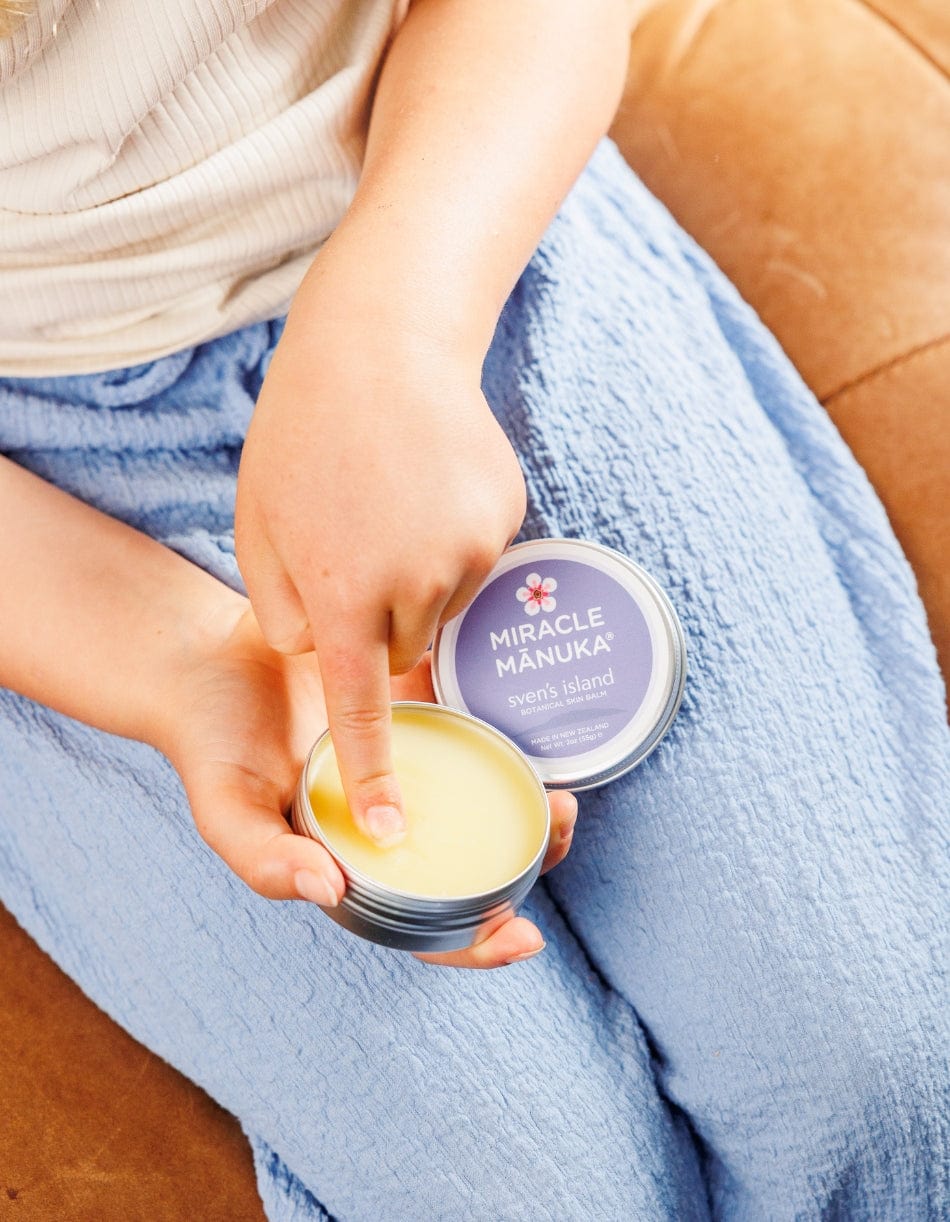
Baby Eczema FAQ
Baby eczema is caused by a mix of genetics, a weak skin barrier, and environmental triggers. If there’s a family history of eczema, asthma, or allergies, your baby is more likely to develop it. Common triggers include soaps, detergents, fragrances, heat, and bacteria such as Staphylococcus aureus.
Dry skin often looks flaky and improves with a regular moisturiser. Eczema usually shows up as red, inflamed, and itchy patches that don’t go away easily. If your baby is scratching often or the redness keeps coming back, it’s more likely eczema.
Yes, many babies outgrow eczema as their skin matures, often by ages 3–5. Some children, however, may continue to have flare-ups into later childhood or even adulthood. Early care helps minimise long-term issues.
Natural treatments that work well include balms with proven ingredients like organic Manuka leaf oil, coconut oil, and beeswax. Oatmeal baths are also popular for soothing irritation. Always choose gentle, fragrance-free products designed for sensitive skin.
Doctors sometimes prescribe steroid creams for short-term relief, but long-term use can cause side effects such as thinning skin. Many parents prefer steroid-free, natural alternatives for ongoing daily care.
Some babies react to foods like dairy, eggs, or soy, which may trigger flare-ups. If you suspect food is making eczema worse, talk to your doctor before making changes to your baby’s diet.
Breastfeeding itself doesn’t cause eczema, but foods in a breastfeeding mother’s diet (like dairy or nuts) can sometimes affect a baby’s skin. If you notice a link, speak with a healthcare professional for guidance.
Yes, many parents report success with natural remedies. The most effective ones usually target both moisture and bacterial imbalance, such as products containing organic Manuka leaf oil, beeswax, or coconut oil.
Short, lukewarm baths once a day or every second day are best. Use mild, fragrance-free cleansers, and always apply a moisturiser or balm immediately after bathing to lock in hydration.
Yes, babies with eczema need daily moisturising — sometimes multiple times a day. Frequent re-application helps prevent flare-ups and keeps the skin barrier strong.
Use a gentle, fragrance-free, dye-free laundry detergent. Harsh chemicals and scents can irritate sensitive skin and trigger eczema flare-ups.
Teething itself doesn’t cause eczema, but the extra drooling and stress on the body can trigger flare-ups in some babies. Keeping the skin clean and well-moisturised helps reduce irritation.
Soft, breathable cotton is best. Avoid wool and synthetic fabrics, as they can trap heat or cause itching, both of which make eczema worse.
Yes, eczema is often linked to allergies and asthma, especially in families with a history of these conditions. Some babies may react to food or environmental allergens, which can make flare-ups worse.
Use cotton mittens or soft gloves at night, keep nails trimmed, and apply balm regularly to reduce itch. Distracting your baby during the day and dressing them in long cotton sleeves can also help.
- Choosing a selection results in a full page refresh.







